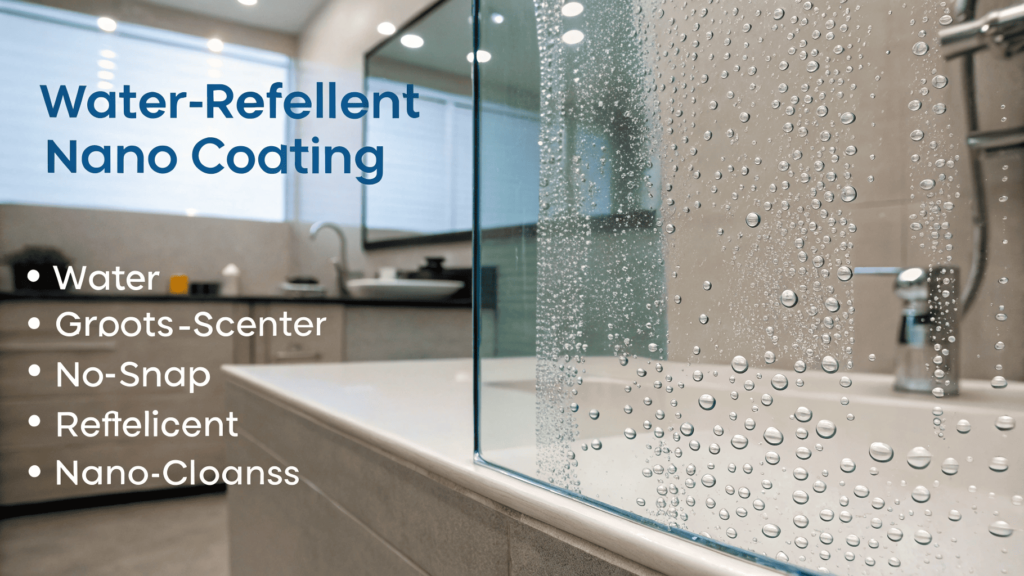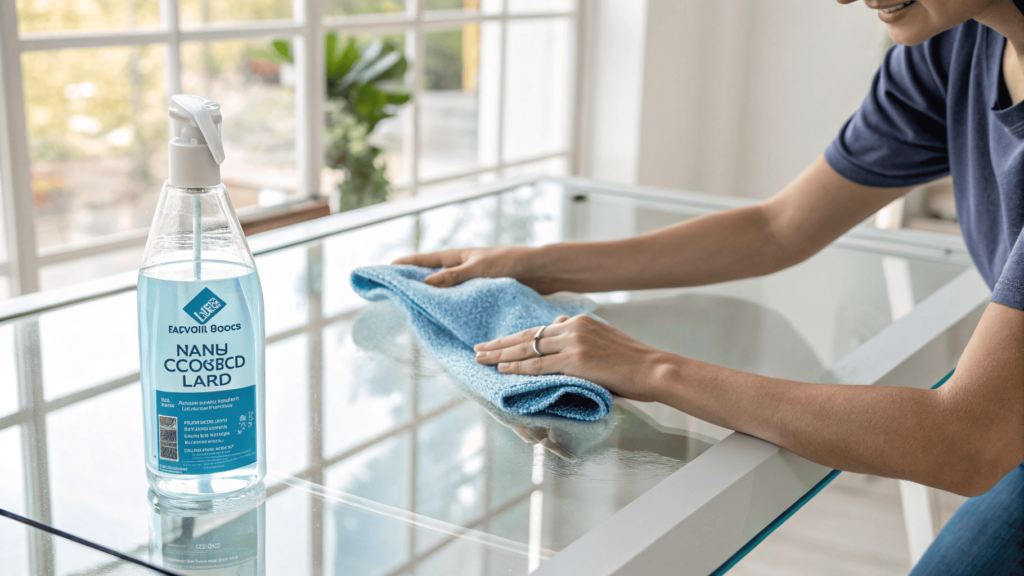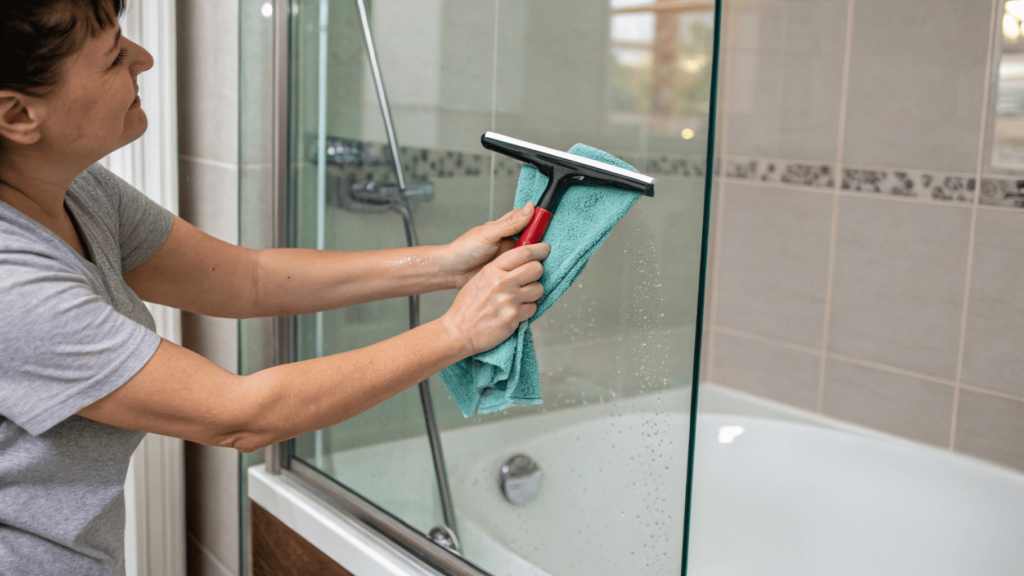Struggling with customer complaints about difficult-to-clean shower glass? Seeing beautiful designs marred by soap scum and water spots? Nano coating offers a modern solution.
Nano coating is an ultra-thin, transparent layer applied to shower glass. It creates a super smooth, water-repellent (hydrophobic) surface. This makes water, soap scum, and minerals bead up and run off easily, significantly reducing cleaning time and effort.
This technology adds real value by making life easier for the end-user. As someone involved in providing the production lines for these coatings, I often get asked about the practical aspects. People want to know if it's durable and how to care for it. Let's start with a common question: how long does this protection actually last?
How long does nano coating last?
Concerned that a nano coating might wear off quickly? Worried about the cost and hassle of reapplication for your customers? Understanding the typical lifespan helps set realistic expectations.
The lifespan of nano coating on shower glass varies, typically lasting from 3 to 10 years or more for quality factory applications. Key factors include initial application quality, coating type, usage frequency, water hardness, and cleaning methods.
Several things influence how long a nano coating remains effective. Let's break it down.
- Application Quality1: This is perhaps the most critical factor. Coatings applied in a controlled factory environment, using specialized equipment like the production lines we supply at Glass Coat, achieve a much stronger bond and uniformity compared to most DIY kits. Our machinery ensures the glass surface is perfectly prepared and the coating is cured correctly for maximum durability. Poor application leads to premature failure.
- Coating Formulation2: Not all nano coatings are the same. Different chemical compositions offer varying levels of durability and hydrophobicity. Industrial-grade coatings designed for longevity generally outperform consumer products.
- Usage and Environment: A shower used multiple times daily will see more wear than one used occasionally. Hard water areas, with high mineral content, also put more stress on the coating as mineral deposits try to form.
- Cleaning Routine3: This is crucial. Using harsh, abrasive cleaners or scouring pads will dramatically shorten the coating's lifespan by physically wearing it down or chemically degrading it. Gentle cleaning preserves the effect.
In my experience, a high-quality, factory-applied nano coating that is maintained correctly provides years of hassle-free, easier cleaning.
How do you clean nano coated glass?
Afraid that cleaning might damage the special nano coating? Worried you'll accidentally strip away the easy-clean benefits? Proper cleaning is actually very simple and requires a gentle touch.
Clean nano-coated glass using only a soft cloth or sponge, water, and a mild detergent (like dish soap) or a pH-neutral glass cleaner. Rinse thoroughly afterward. Avoid abrasive powders, harsh chemicals (acids, alkalis), and rough scouring pads.
Maintaining the water-repellent effect4 is straightforward if you avoid damaging the ultra-thin layer. Here’s a more detailed look:
- Recommended Tools: Microfiber cloths are ideal. They clean effectively without being abrasive. Soft sponges are also suitable.
- Recommended Cleaners: Simple liquids are best. Water is often enough for light cleaning. For soap scum, a few drops of mild dish soap5 or a cleaner specifically marked as safe for coated glass and pH-neutral works well. Always rinse the glass with clean water after washing to remove any residue.
- What to Avoid: This is critical. Do not use abrasive powders6 (like Comet or Ajax), scouring pads (including green or metal ones), steel wool, or scrapers. Also, avoid strong acidic cleaners (like concentrated vinegar or harsh limescale removers) and strong alkaline cleaners (like oven cleaner). These substances can chemically etch or physically abrade the nano coating, destroying its properties.
Think of it like caring for a non-stick pan – harsh scrubbing ruins the surface. Gentle cleaning preserves the easy-clean benefit for years.
Here's a simple comparison:
| Do Use | Don't Use |
|---|---|
| Soft Microfiber Cloth | Abrasive Scouring Pads |
| Soft Sponge | Steel Wool / Metal Scrapers |
| Water | Abrasive Powder Cleaners |
| Mild Soap (e.g., Dish Soap) | Harsh Chemicals (Strong Acids/Alkalis) |
| pH-Neutral Glass Cleaner | Concentrated Limescale Removers |
| Squeegee (for drying) | Hard-Bristle Brushes |
Following these simple guidelines ensures the coating continues to perform as intended.
How do you maintain nano coating?
Noticing water isn't beading up quite like it used to? Concerned the nano coating needs some special or complex upkeep routine? Good maintenance is surprisingly simple and mainly involves proper cleaning habits.
Maintain nano coating primarily through regular, gentle cleaning with soft cloths and mild soap. Using a squeegee to dry the glass after each shower is highly recommended to prevent mineral buildup. Avoid harsh impacts and abrasive materials.
Preserving the nano coating's effectiveness over its lifespan really comes down to consistent, gentle care. There isn't a complex routine needed, just good habits.
- Regular Gentle Cleaning7: As we just discussed, prevent soap scum and hard water deposits from building up by cleaning regularly with non-abrasive tools and mild cleaners. Don't let residues sit on the surface for extended periods.
- The Power of the Squeegee8: This is probably the best maintenance tip I can offer based on feedback. Removing the water droplets with a soft silicone squeegee right after showering takes only seconds but drastically reduces water spotting and mineral buildup. Less buildup means less need for even mild scrubbing later, preserving the coating.
- Avoid Physical Damage: Protect the glass from hard impacts or dragging rough items across the surface. While the coating adds some resilience, it's still glass underneath. Significant scratches can compromise the coating in that area.
- Monitor Performance9: You'll know the coating is working well when water clearly beads up and rolls off. If water starts to 'sheet' or spread out more, it might indicate the coating is either dirty (residue masking the effect) or nearing the end of its effective life. A thorough clean with a recommended cleaner should be the first step if performance seems reduced.
Consistent, simple care routines like these are key to maximizing the longevity and performance of the nano coating.
Is Nano glass scratch resistant?
Thinking nano coating makes shower glass completely scratch-proof? Worried about potential scratches even with the coating applied? It helps protect the surface, but it's important to understand the level of resistance it offers.
Nano coating enhances surface hardness slightly and makes the glass slicker, helping it resist minor surface abrasions and micro-scratches often caused by routine cleaning. However, it does not make the glass fully scratch-proof against sharp objects or significant force.
Let's clarify what "scratch resistance" means in this context. The nano coating creates an incredibly smooth, dense, and low-friction surface by filling the microscopic pores naturally present in glass.
- How it Helps: This smoothness means that small particles (like fine dust) encountered during gentle cleaning with a soft cloth are less likely to catch and cause micro-scratches compared to uncoated glass. It provides improved resistance to the kind of minor wear that happens during normal, careful maintenance.
- Its Limits: The coating layer is extremely thin – measured in nanometers (billionths of a meter). It simply doesn't have the physical bulk to stop a concentrated point of pressure. A sharp edge like a razor blade used for scraping, a dropped tool, abrasive grit trapped under something heavy, or deliberate vandalism will still scratch the underlying glass.
- Resistance vs. Proof: It's crucial to distinguish between scratch-resistant and scratch-proof. Nano coating makes the surface more resistant to light, everyday rubbing and micro-abrasions. It does not make it immune to scratching.
Think of it as adding a layer of clear varnish to wood. It protects against minor scuffs and makes cleaning easier, but dropping a heavy object or dragging a sharp one across it will still damage the wood. Therefore, continue to treat nano-coated glass with care, especially avoiding abrasive cleaners and tools, to maintain both the coating and the glass itself.
Conclusion
Nano coating offers a significant advantage for shower glass, making it much easier to clean and keep looking pristine. Understanding its lifespan, proper cleaning, and maintenance ensures years of benefit.
-
Understanding application quality can help you choose the right nano coating service for optimal results. ↩
-
Exploring coating formulations can guide you in selecting a nano coating that meets your durability needs. ↩
-
Learning about the best cleaning practices can extend the life of your nano coating and enhance its performance. ↩
-
Explore effective techniques to maintain the water-repellent effect and prolong the life of your surfaces. ↩
-
Learn why mild dish soap is recommended for cleaning coated glass and how it protects the surface. ↩
-
Understand the risks of using abrasive powders and how they can damage your surfaces permanently. ↩
-
Explore this link to learn effective cleaning techniques that will help maintain your nano coating's effectiveness and longevity. ↩
-
Discover the benefits of using a squeegee for your nano coating maintenance and how it can save you time and effort in the long run. ↩
-
Find out how to effectively monitor your nano coating's performance to ensure it remains effective and to know when to clean or replace it. ↩









